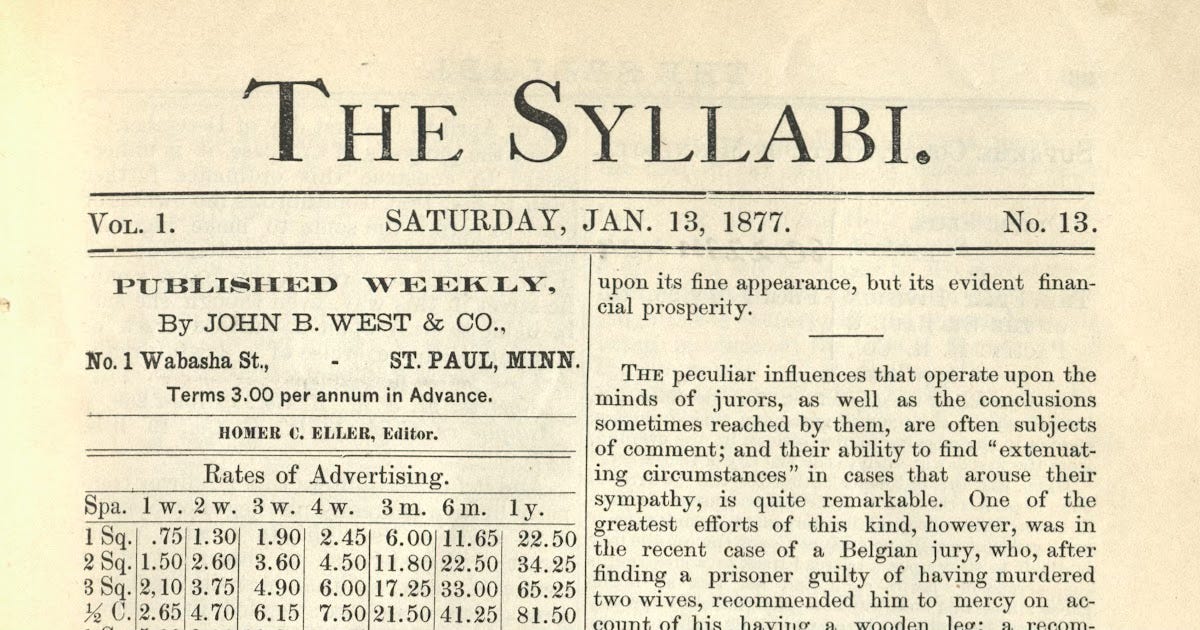This Day in Legal History: West Law Reports Published
On October 21, 1876, the West Publishing Company, founded by John B. West, published its first legal reporter, The Syllabi. This marked the beginning of a transformation in how American legal professionals accessed and utilized case law. The Syllabi aimed to provide Minnesota lawyers with timely, accurate, and reliable legal information, distinguishing itself through its promise to be "prompt, interesting, full, and at all times thoroughly reliable." Over time, The Syllabi evolved into the Northwestern Reporter, which played a significant role in shaping the broader National Reporter System.
West's innovation was groundbreaking because it standardized the reporting of judicial decisions across multiple jurisdictions, creating a centralized, accessible body of case law. The National Reporter System expanded to cover decisions from various courts in different regions, making it easier for lawyers to research case law beyond state boundaries. This system eventually became the foundation for modern legal research and was essential for the creation of tools like Westlaw, which revolutionized legal research with digital access in the 20th century.
It is worth noting, the development of a centralized legal reporting system, while transformative, also raises important access to justice issues. West Publishing’s dominance in legal reporting and the eventual emergence of paid research platforms like Westlaw created barriers for individuals and smaller firms with limited financial resources. The high cost of accessing comprehensive legal databases places those without the means at a significant disadvantage, potentially hindering their ability to conduct thorough legal research or build strong cases. This disparity underscores the ongoing challenge of ensuring equal access to legal resources, a critical factor in promoting fairness within the justice system.
China-based drone manufacturer DJI has filed a lawsuit against the U.S. Defense Department, challenging its inclusion on a list of companies allegedly linked to Beijing’s military. DJI claims the designation is inaccurate and has caused substantial financial harm, including lost business deals and a tarnished reputation. The company, which controls over half of the U.S. commercial drone market, argues it is neither owned nor controlled by the Chinese military and seeks removal from the list. DJI alleges that the Pentagon did not engage with the company for over 16 months regarding the designation, leaving it no choice but to pursue legal action. The Pentagon has not commented on the suit.
DJI is also facing increasing scrutiny in the U.S., with concerns raised about potential security risks from its drones. Earlier this week, U.S. Customs stopped some DJI imports under the Uyghur Forced Labor Prevention Act, though DJI denies any involvement with forced labor. Meanwhile, the U.S. House has passed a bill to ban new DJI drones, pending Senate action.
Drone maker DJI sues Pentagon over Chinese military listing | Reuters
Eli Lilly has filed lawsuits against three medical spas and online vendors—Pivotal Peptides, MangoRx, and Genesis Lifestyle Medicine—over selling unauthorized versions of its weight-loss drug, Zepbound, which contains tirzepatide. These lawsuits, filed in federal and state courts, accuse the companies of false advertising and promotion, including selling products without medical prescriptions and making unverified claims about the drug’s safety and efficacy. Pivotal Peptides allegedly marketed tirzepatide for research but sold it directly to consumers, while MangoRx offered an unapproved oral version of the drug. Genesis was accused of selling compounded tirzepatide with vitamin B12, a combination that Lilly says is unsafe and untested. Lilly’s lawsuits follow earlier legal actions against other companies for similar offenses. The drugmaker aims to protect consumers from potential health risks and seeks to stop the defendants from selling these products, as well as pursuing monetary damages.
Lilly sues online vendors, medical spa over copycat weight-loss drugs | Reuters
Four prominent labor lawyers from Baker McKenzie's New York employment practice—Paul Evans, Krissy Katzenstein, Blair Robinson, and Jeffrey Sturgeon—have moved to Paul Hastings, leaving Baker McKenzie short one-third of its employment lawyers. The team has represented Fox News in several high-profile employment disputes, including defending the network in cases involving former host Britt McHenry and a COVID-19 workplace exposure claim. The team has also worked with clients like CBS Broadcasting, Paramount Global, and Panda Express. Their move to Paul Hastings follows collaborations with the firm's employment lawyers, and they plan to continue growing Paul Hastings' client relationships.
The transition strengthens Paul Hastings’ East Coast employment practice, enhancing its capacity in complex employment matters, including Title VII representation, pay equity, and class actions. Paul Hastings' leadership sees this as a significant boost, especially ahead of regulatory shifts tied to the 2024 presidential election.
Fox News Employment Defense Team Moves Over to Paul Hastings
New Jersey Transit Corp. (NJ Transit) is facing a patent infringement lawsuit from Railware Inc., which claims NJ Transit is using its railworker-safety technology without permission. NJ Transit is seeking to dismiss the case, asserting sovereign immunity as an "arm of the State of New Jersey." The issue is complicated by the fact that NJ Transit operates in both New Jersey and New York. While the Third Circuit, which covers New Jersey, has previously ruled that NJ Transit qualifies for immunity, the Second Circuit, which covers New York, uses a stricter test to determine state immunity. This case is significant because it could set a precedent for how sovereign immunity is applied across jurisdictions.
Railware argues that NJ Transit’s immunity claim is invalid, citing the agency’s independent operation and non-state funding. The case also touches on broader legal debates about when state agencies can claim immunity in patent cases. NJ Transit is awaiting a key ruling from the New York Court of Appeals on whether it is immune from another lawsuit, which could influence this case. If conflicting rulings emerge from different courts, the matter may be escalated to the U.S. Supreme Court for resolution.
NJ Transit Patent Immunity Claim Crosses Circuit-Court Divide













